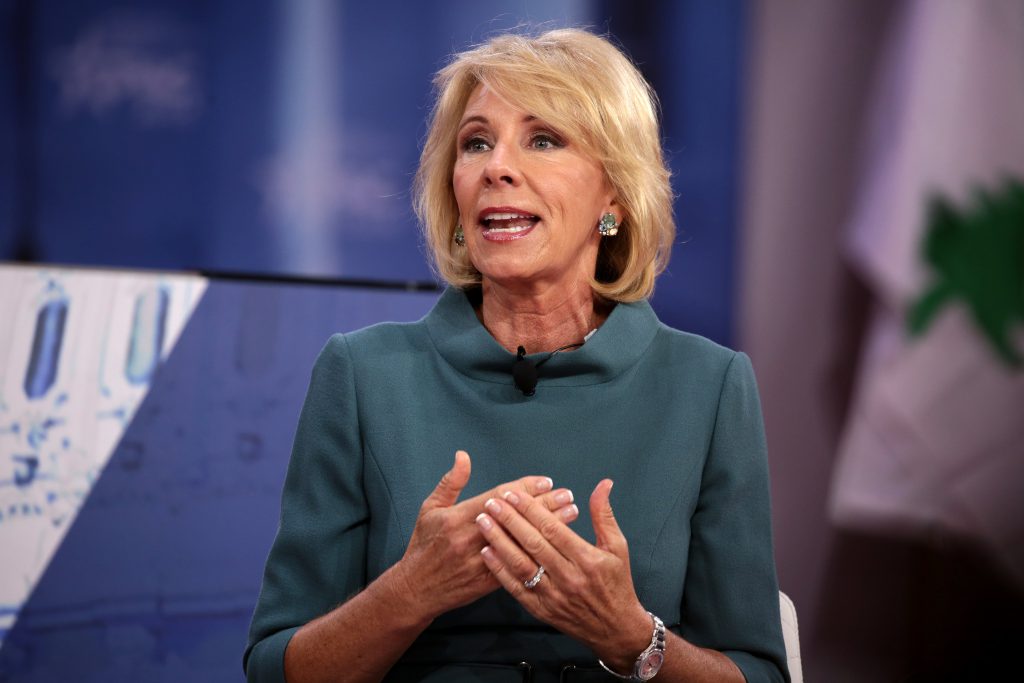Evers Rejects UW System Rules on Sex Assault
System changes, in line with new federal regulations on sex harassment and assault, could have 'chilling' effect on victims, Evers says.

U.S. Secretary of Education Betsy DeVos speaking at the 2018 Conservative Political Action Conference (CPAC) in National Harbor, Maryland. By Gage Skidmore. (CC BY-SA 2.0)
On Monday, Gov. Tony Evers rejected the first step in UW System President Ray Cross’ proposal to alter state law under the new Title IX federal regulations laid out by U.S. Secretary of Education Betsy DeVos in early May.
Implementing such changes to sexual misconduct laws requires the University of Wisconsin System to go through Wisconsin’s administrative rulemaking process, beginning with a scope statement, which Evers rejected.
“Title IX has helped generations of students address systemic sex-based discrimination in our education system,” Evers wrote in a June 15 letter to Cross. “Education and civil rights leaders across the nation have voiced strong concerns about the new federal regulations and the chilling effect they will have on survivors of sexual harassment and sexual assault.”
Title IX of the Education Amendment Act of 1972 prohibits discrimination on the basis of sex for any school or university programs that are federally funded. When DeVos issued final regulations last month, she said they must be implemented by Aug. 14, 2020, before the fall semester begins.
The most controversial piece of those regulations is that it narrows the definition of sexual harassment under Title IX. DeVos has said she made changes to give more rights to those accused of harassment or assault. That includes giving the accused the right to question evidence and to cross-examine their accusers.
Detractors argue that the changes could keep victims from coming forward.
Evers cited two reasons for rejecting the System’s scope statement. The first was that it did not “adequately identify the specific provisions UWS is proposing to change” in state law.
“In particular, the scope statement does not indicate whether UWS will weaken or strengthen the definition of sexual harassment,” wrote Evers, citing the specific chapter of state law. “… This is problematic because the federal regulations restrict access to the Title IX complaint process and make the process more difficult for survivors, including weakening the federal definition of sexual harassment.”
Evers also wants UW’s scope statement to spell out any potential consequences that limiting access to the Title IX process could have on students.
On June 4, Evers authorized Attorney General Josh Kaul to file a complaint against the Trump administration’s attempts to weaken sexual harassment and assault protections on campus.
“Secretary DeVos is taking us backwards by weakening Title IX protections,” said Kaul, who joined 17 other states in filing the complaint. “And the harm from this misguided rule will be compounded by the requirement that schools rush to overhaul their Title IX procedures during a pandemic.”
Evers was also highly critical of DeVos’ changes earlier this month in authorizing the attorney general to make the complaint. At the time Evers stated, “We know that sexual assault and harassment is a pervasive issue, impacting students across our campuses, classrooms, and state. These changes do nothing to serve our kids and will have immeasurable, tragic impacts on the survivors of these crimes. Students deserve to be safe from fear, harassment, and discrimination in our schools and on our campuses, and I urge the federal government to reconsider these damaging changes.”
In filing the complaint, Kaul cited how rampant sexual misconduct is in schools: “In grades 7–12, 56% of girls and 40% of boys are sexually harassed. In college, nearly two-thirds of both men and women will experience sexual harassment.”
“This chronic problem is vastly underreported and under-addressed,” Kaul continued, “but instead of encouraging robust enforcement of Title IX’s antidiscrimination promise, the Trump Administration has violated key protections by discouraging reporting and sowing confusion on campuses across the country.”
Kaul and the other attorneys general found the most problematic “flaws” of the new regulations are that they:
- Narrow the protections for students and others by redefining “sexual harassment” to exclude a broad spectrum of discriminatory conduct from Title IX’s reach, arbitrarily excluding incidents of sexual harassment based on where they occur, and limiting when schools can respond to serious sexual misconduct;
- Require extensive and unnecessary new procedural requirements that will reduce the number of reports and investigations and undermine the ability of schools to provide a fair process to all students;
- Force schools to dismiss any reports of sexual harassment that don’t rise to the new rule’s unreasonably high standard, requiring schools to create new rules and procedures to address Title IX harassment but use a different set of rules to address non-Title IX harassment. This will cause confusion, chill reporting, and make our schools less safe; and
- Demand schools make significant changes by mid-August in the midst of the COVID-19 pandemic. This will require schools to bypass the mechanisms that allow students, parents, faculty, staff, and community members to help shape important school policies.
Reprinted with permission of Wisconsin Examiner.




















